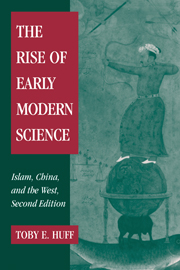Book contents
- Frontmatter
- Dedication
- Contents
- List of illustrations
- Preface to the second edition
- Preface to the first edition
- Acknowledgments
- Introduction
- 1 The comparative study of science
- 2 Arabic science and the Islamic world
- 3 Reason and rationality in Islam and the West
- 4 The European legal revolution
- 5 Madrasas, universities, and science
- 6 Cultural climates and the ethos of science
- 7 Science and civilization in China
- 8 Science and social organization in China
- 9 The rise of early modern science
- Epilogue: educational reform and attitudes toward science in the Muslim world and China since the eighteenth century
- Selected bibliography
- Index
Preface to the second edition
Published online by Cambridge University Press: 05 June 2016
- Frontmatter
- Dedication
- Contents
- List of illustrations
- Preface to the second edition
- Preface to the first edition
- Acknowledgments
- Introduction
- 1 The comparative study of science
- 2 Arabic science and the Islamic world
- 3 Reason and rationality in Islam and the West
- 4 The European legal revolution
- 5 Madrasas, universities, and science
- 6 Cultural climates and the ethos of science
- 7 Science and civilization in China
- 8 Science and social organization in China
- 9 The rise of early modern science
- Epilogue: educational reform and attitudes toward science in the Muslim world and China since the eighteenth century
- Selected bibliography
- Index
Summary
When this study first went to press in the early 1990s, there was a lingering suspicion in some quarters that modern science was a peculiar preference of the Western world, that in the history of global science the Arabs and Muslims as well as the Chinese (with their more otherworldly values) had other preferences and never intended to contribute to modern science. And who needs it anyhow?
Today that sense has dissipated. It now seems evident that modern science and technology are intimately connected to economic development and to the amelioration of the human condition. Moreover, historians of what is now identified as “colonial science” have begun to suggest that at least early and tentative steps toward modern science were made long ago in many countries around the world by indigenous individuals who were drawn to the study of the natural world before the encroachment of the West. Although some of these studies have gone a little too far in extolling ethnically based cognitive systems that purport to be self-contained and complete, others have found more open-ended endeavors that can be seen as contributions to “universal” science.
In the field of medicine, surgeons in many Muslim countries today, such as Iran, Saudia Arabia, Pakistan, and Tunisia, have the skills to perform and have been performing organ transplants (heart, liver, cornea) for some time. Tunisia has had this capacity since the early 1970s. Now Tunisia has an organ donor program and even a very low-profile genetic counseling program to avert the genetic consequences of cousin marriages in Arab populations. Likewise, some Chinese scientists are currently at the cutting edge of stem cell research.
The major question facing developing countries today is not whether they will accept the results of natural science but whether their governing elites will grant autonomy to all of their aspiring scientists – social and natural. Will they allow their scientists to objectively describe the social and natural worlds and publicly report their results, above all, when those results cast political authorities in a poor light? That is the challenge of the twenty-first century.
- Type
- Chapter
- Information
- The Rise of Early Modern ScienceIslam, China and the West, pp. xiii - xviPublisher: Cambridge University PressPrint publication year: 2003



